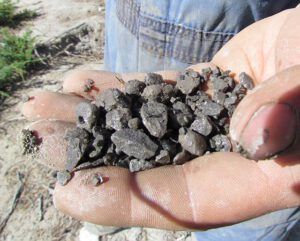Good water is hard to find in the Chilcotin. Shallow wells taste swampy and deep ones are full of iron or sulphur, or, in some cases, arsenic. Ginty Creek did not come with a potable water supply. The river runs at the bottom of the two properties, but it needs to be boiled to be drunk, is brown for half the year, is too difficult to get in the winter, and it is almost a kilometre from the house. The creek often dries up in summer and even when boiled for half an hour, tastes of pure swamp. My main desire, when I had the money after selling Nuk Tessli, was to have a well drilled.
This is a major gamble. Friends spent $21,000 and did not get a scrap of water; I heard of another well that cost $30,000 with no result. Another man had to drill to 650 feet – another $30,000 well, but he at least had plenty of water. The tow truck driver who took me to town recently, had a 60-foot well that had beautiful water – for a month. Then is started going rusty and was soon pure orange. He ran some into a holding tank to see if it would settle but it fermented and was worse than ever. His cows got sick drinking it. Across the road, another man drilled 200 feet and got 75 gallons a minute, enough to supply a small town.
Christine Peters (author of The Lure of the Chilcotin) had a well drilled 3 years ago. Most of it was through bedrock. She was going to cut off at $20,000. They had reached 400 feet. But the drillers kept going another 90 feet for free and she got 2 cups a minute. At first, it was full of arsenic, but gradually this has dissipated. She came along to Ginty Creek watch the show.
The drillers tell us that some witched wells produce water and others do not. Even if they can witch themselves, they refuse to take responsibility for the choice of site. I seemed to be able to witch. I heard that you could use straightened coat hangers: I had no coat hangers (which says something for the state of my wardrobe) but the telegraph line used to run through my property and the previous owner made fences of it. Much is now lying around in huge tangles. So I broke of a couple of lengths, bend one end of each for a handle, and held them in front of me like a film star cowboy having a shoot-out at high noon. When water is registered, the rods swing across the witcher’s body. A good supply makes them touch the witcher’s shoulders.
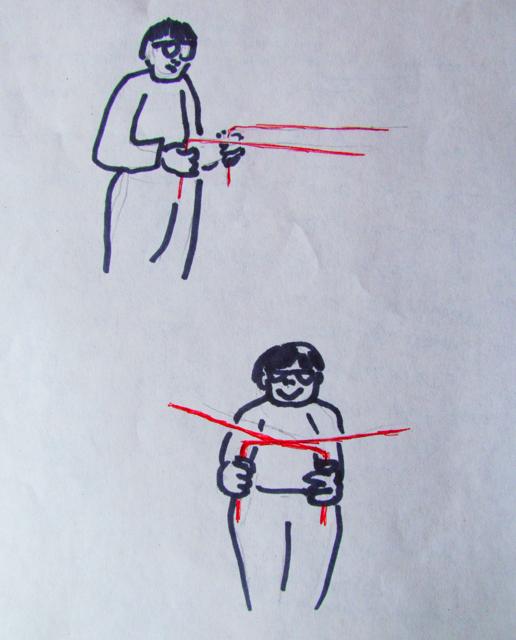
Before I went to Nuk Tessli, a rep from the drilling company, JR Drilling Central (based in Kamloops: no Williams Lake company wanted to be bothered coming out west: they can make much more money with industrial drilling, so we were lucky that JR Drilling would come) came to look at my site, and that of several other local people who also wanted wells. Most of these were summer people so not around, and I drove with the rep (who happened to be the owner) to look at the sites. There had to be room for two large, heavy trucks to park near each other; in many cases trees would have to be fallen and stumps cut out of the way.
At one site, the ground would also have to be levelled. So we looked at a less destructive location for the absent owner. I started witching with my rods. Don, the owner, could not resist trying as well – he got much the same results as I did. The neighbour saw us and came to chat: she said you could witch with an egg. She went and fetched one. You hold the egg on your palm: when there was water, it stood on end. So there we were, walking up and down watching an egg on our palms. Don said it twitched for him: it did nothing at all for me!
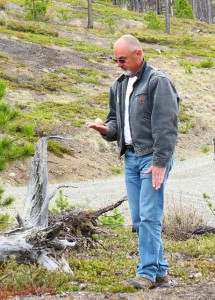
The morning after I got back from town with my van, the well-drillers arrived. I had witched a site quite close to the house.
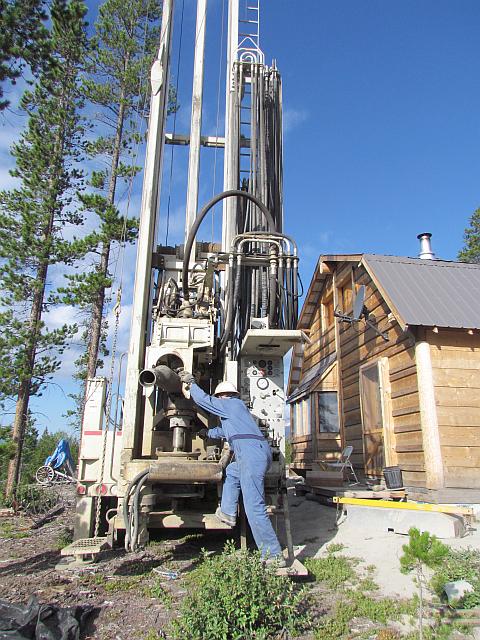
The signal was not all that strong, but there seemed to be nothing better in the area. For many years I have used a pendulum for various health matters – mainly food sensitivities – and I wondered if the pendulum could tell me the depth. The pendulum gives yes/no/maybe answers. I asked if there was enough water more than 100 feet down: No. More than 50 feet? Yes. In that way I determined it was 60 feet down, which was good news.
While Jerry was setting up the drill, Dean was unloading the drill sections and the casings.
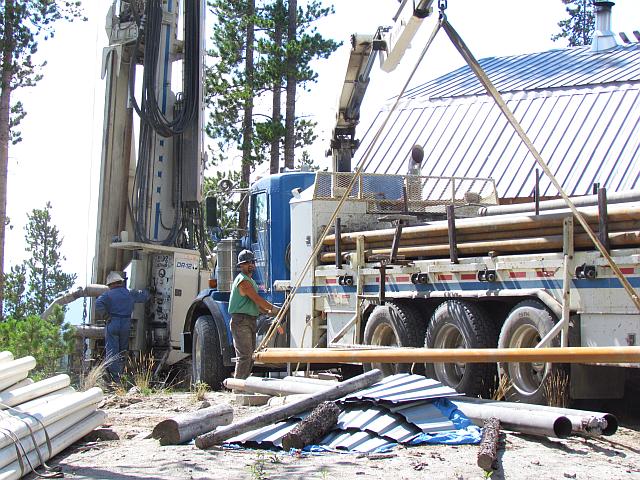
They were married to the carriage (I do not know the technical term of this part of the drill tower, but it seems appropriate)
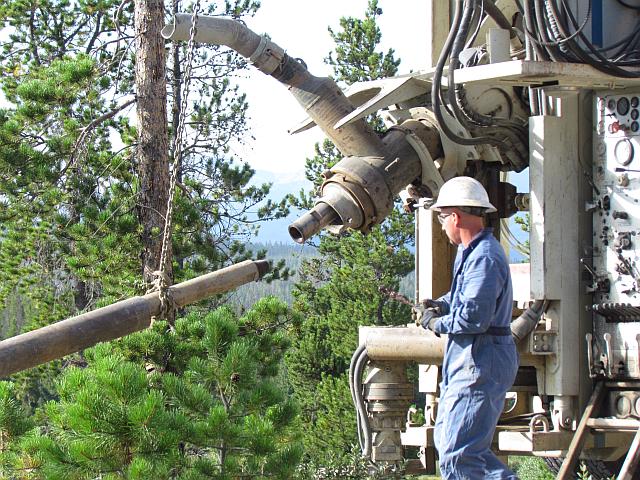
Then lifted into place.
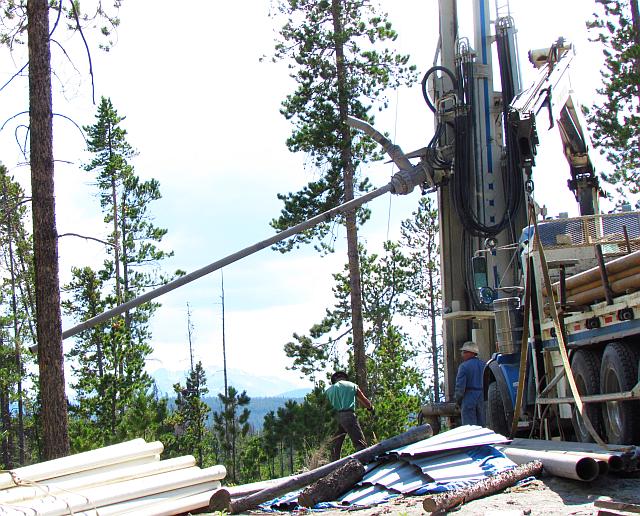
The bit was positioned exactly over my witched mark.
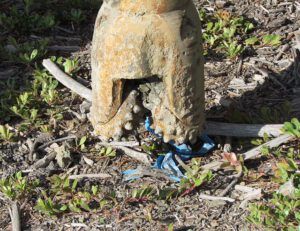
The Chilcotin is largely volcanic with a thick layer of glacial tilth on top. It was a no-brainer that the first part of the well would go through silt, sand or gravel. Thar she blows!
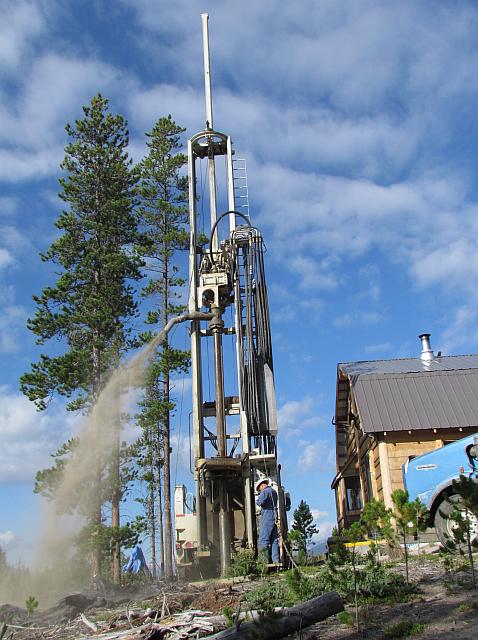
Because of the loose material, each section had to be cased. Within minutes, the first 20-foot section was in the ground and the second casing was positioned and welded on.

Bentonite was poured into the hole. This swells and seals the well so that surface water cannot run in and contaminate it.
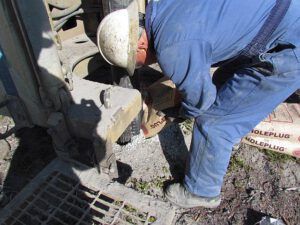
If I interpreted the pendulum correctly, I would need only 3 sections. But when the third casing was put together, Dean was already unloading more sections. He obviously had no faith in my efforts!
And we did get water at around the depth I had predicted. But it was totally mixed with fine soil and there was no way it would make a well. It came out of the discharge pipe in clumps.
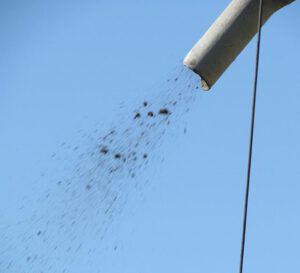
Was this what the witching rods had depicted? Would there be any more if we went deeper? Then Christine Peters and I got very excited because water began to pour out.
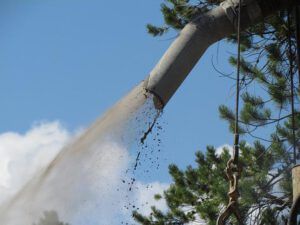
But it was a false alarm. The drillers were having to pump water in to keep the drill from clogging up!
Four or five hours had now gone by. The well was a hundred feet deep. Things started to go very slowly. A sample was taken – using a very high-tech tool: a kitchen sieve clamped on to the end of a pole.
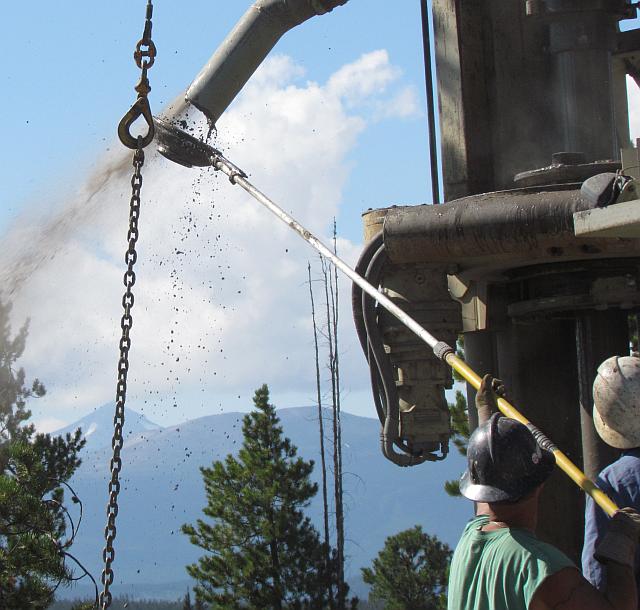
Jerry announced we had hit bedrock.
